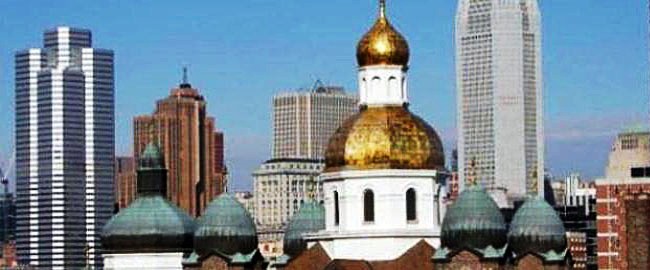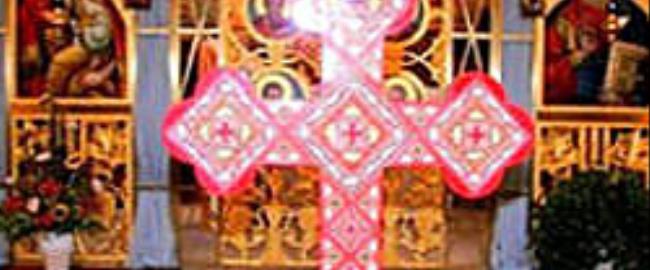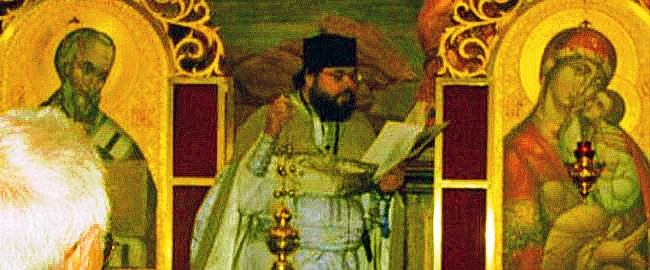WHAT DOES IT MEAN WHEN WE SAY:
“I am maturing in LIVING THE CHURCH’S LIFE”? or
“I am learning how to “LIVE THE SACRAMENTS”?
In the Bible footnotes supplied by the St Athanasius Academy for Hebrews
5:11-14 and 6:12 we learn that “when Christians are not growing
spiritually, doctrine is difficult to explain to them. Let us repent of
being dull of hearing - a constant criticism of Christ and the prophets
had of God’s people – and habitually and vigorously exercise ourselves
in spiritual matters.” St John Chrysostom taught persistently that “The
primary spiritual exercise is the study and knowledge of the
Scriptures.”
Like the physical growth of our bodies, or the development of our
feelings-emotions and thoughts-minds, our growth “in life, in faith and
in spiritual understanding” also comes in overlapping stages.
STAGE 1.
Our "Everyday Time" is interrupted now and then by "Church
 Times".
“When do I have to go to church?” is a big deal at this
“spiritual baby” stage of Christian development. This is done when – if
we are able to – we go to Church on Sundays and not on all of the 12
major Feast days, but only some of them, which are called “holy days of
obligation”. Also, very important at this stage are the questions, “When
is the service going to begin?” “When is the service going to end?”
“Why is it so long?” Our involvement stays utterly passive. The
underlying motivation for attending church services and living a Godly
life is like that of having an uncomfortable job working in a factory,
but one that pays my bills, so: I’m not attached to this factory and
will work here only so long as the benefits are good to me; I don’t
know, and don’t really want to know the boss or owner, all I want is to
punch the time clock so as not to get into trouble; I get it over with,
out of the way, as soon as possible; this is what I have to do in order
to get back to the things I actually like and want to do; tell me what
is the least that I have to do in order not to get kicked out, etc.
We are still so infected with modern spiritual illnesses (for example:
minimalism, individualism and hedonism) that we do not yet even realize
that we are suffering from them.
Times".
“When do I have to go to church?” is a big deal at this
“spiritual baby” stage of Christian development. This is done when – if
we are able to – we go to Church on Sundays and not on all of the 12
major Feast days, but only some of them, which are called “holy days of
obligation”. Also, very important at this stage are the questions, “When
is the service going to begin?” “When is the service going to end?”
“Why is it so long?” Our involvement stays utterly passive. The
underlying motivation for attending church services and living a Godly
life is like that of having an uncomfortable job working in a factory,
but one that pays my bills, so: I’m not attached to this factory and
will work here only so long as the benefits are good to me; I don’t
know, and don’t really want to know the boss or owner, all I want is to
punch the time clock so as not to get into trouble; I get it over with,
out of the way, as soon as possible; this is what I have to do in order
to get back to the things I actually like and want to do; tell me what
is the least that I have to do in order not to get kicked out, etc.
We are still so infected with modern spiritual illnesses (for example:
minimalism, individualism and hedonism) that we do not yet even realize
that we are suffering from them.
STAGE 2.
When we become more actively involved in worship and prayer, we are like
“spiritual children”. We start attending services regularly. We
celebrate days other than merely the “Obligatory” Sundays and feasts,
for example: All Soul’s, Wednesdays and Fridays of Lent, minor feast
days, Major Feast days that are not obligatory, etc. We begin and
maintain a daily discipline of prayer. We only just begin to realize
that God has a time all His own that is different from our own time and
that even if we have not yet figured it all out, our intuition tells us
that God has a good reason for it, and it has nothing to do with His
being a Taskmaster, or factory foreman, over us. It begins to dawn
on us that we may have picked up willy-nilly from our surroundings some
“spirits” (i.e. ideas) which are inconsistent with a true Life in
Christ, for example: individualism (What’s in it for me?), hedonism (If
it feels good, do it, if it feels bad, run from it!) and minimalism
(What’s the least I have to do in order to be a member of the Church and
to squeeze into heaven?). It begins to dawn on us that we need to do
something about disentangling ourselves from “the spirit of this age”
because it is not at all a healthy way of being, thinking, feeling, etc.
STAGE 3.
We start accepting – rather than explaining away or fighting against –
there being a “God’s time” and “our time” which are different. This
reality becomes OK with us. We no longer fuss over it, but live by two
calendars: our "Everyday Calendar" and our "Church Calendar." At first,
one of the calendars will dominate. We are like “spiritual teenagers”,
not yet really adults, but not really children anymore. Gradually we
begin to put the two calendars together through (a) daily prayer, (b)
regular and willing attendance at most worship services, which we now
begin to understand and participate in, (c) seeking to do the will of
God at all times. Good deeds and the so-called “Precepts of the Church”
start becoming more and more second nature to us, rather than being a
target, which we merely hit every now and then. We choose to fight
daily against the prevailing evil spirits of our day and age: the
spirits of minimalism, individualism and/or hedonism. We do not
pray, fast and do good works because we have to, but because we
choose to do them for the glory of God.
STAGE 4.
We become fully “orthodox” (true in faith, relationship with Christ is
relationship with Truth itself, I believe what He believes) and catholic
(universal in love, relationship with Christ is relationship with Love
itself, I love the way He loves). Pope John Paul II (the Great), of
Blessed Memory, specifically said that our Ukrainian, Catholic Church is
called to be, in his words, “orthodox in faith and catholic in love”
when he spoke to us at our Ukrainian Catholic Cathedral in Buenos Aires,
Argentina, on April 10, 1987. It is the will of God that all of us are
meant to become “spiritual adults” who have reached full maturity: “the
stature of the fullness of Christ” (Ephesians 4:13 and Hebrews 6:1-3).
Our calendars should be integrated as one. In this stage of growth we
become aware of how the "Church Time" penetrates the "Everyday Time".
Our "Church Time" informs and brings hope of the Kingdom to our
"Everyday Time". The practice of the Theological and Cardinal Virtues,
and the Gifts of the Holy Spirit (Isaiah 11:2-3) and the Fruits of the
Holy Spirit (Galatians 5:22-23) become more and more real in us.
Thus, Living the Church’s Life, or Living the Sacramental Life, is about
integrating a process, or what St. Paul calls “working out one’s
salvation with fear and trembling” (Phil. 2:12). Those who teach that
salvation is a legalistic event, or a magical moment, or a one-time
declaration of faith in Christ often intimidate unprepared Catholics and
Orthodox by saying “Are you saved?”, but they are unfortunately quite
mistaken. We should learn to respond to such bully tactics by “living
the Truth in Love” (Ephesians 4:15), saying firmly, but kindly, that:
“I was saved when Jesus died for me on
I am being saved to the degree that I participate in the life of Christ
and that of His Body, the Church, and
I will be saved when Jesus returns to judge heaven and earth and it is
He who will proclaim definitively that I did accept and live a real Life
in Christ.”
A mature Life in Christ is about consistency and persistence in
repenting for our sins as a result of embracing belief in the message of
His Holy Gospel. Every baptized and chrismated (confirmed) Catholic
Christian, whether Byzantine or Roman, is called to this Spirit-filled
Life in Christ. It is not just for “professional Christians”, like
priests, deacons, monks, nuns, and religious brothers and sisters.
Jesus described the
If not the warning of Hebrews 5:11-14 and 6:12,
then at let us at least heed the warning of St. Gregory the Dialogist
(Pope St. Gregory the Great of Rome), + 12 March 604, given in his
“Sermon on the Gospels, Matthew 22:1-13,” paragraph 8:
“And it should not frighten you that in the Church the bad are many and
the good few.
 For
the Ark, which in the midst of the Flood was a figure of this Church,
was wide below and narrow above, and at the summit measured but one
cubit (Genesis 6:16). And we are to believe that below were the
four-footed animals and serpents, above the birds and men. It was wide
where the beasts were, narrow where men lived: for the
For
the Ark, which in the midst of the Flood was a figure of this Church,
was wide below and narrow above, and at the summit measured but one
cubit (Genesis 6:16). And we are to believe that below were the
four-footed animals and serpents, above the birds and men. It was wide
where the beasts were, narrow where men lived: for the






